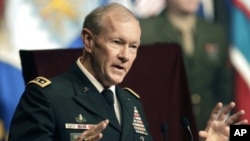Pentagon leaders are defending the Obama administration’s decision to pull U.S. troops from Iraq by the end of the year, despite questions about continuing violence in the country and the threat of Iranian intervention.
President Obama last month announced that all troops will be out by December 31. The decision came after Washington failed to reach an agreement with the Iraqi government on granting legal immunity to any U.S. troops who were to remain in the country.
On Tuesday, U.S. Defense Secretary Leon Panetta and the top U.S. military officer, the chairman of the Joint Chiefs of Staff General Martin Dempsey, went to Capitol Hill to defend that decision before members of the Senate Armed Services Committee. They faced tough questions from Republican Senator John McCain, who criticized the administration’s failure to reach an agreement with the Iraqis.
Panetta said the administration had no choice but to fulfill a 2008 U.S. agreement to withdraw the troops by the end of 2011. He said he believes Iraq is now an independent and sovereign country that can govern itself, and he hopes its leaders will make the right decisions for their people. “For our part, the United States is ready to mark the beginning of a new phase in our relationship with Iraq, one that is normal, similar to others in the region, and based on mutual interests, and mutual respect," he said.
More than 4,400 Americans have been killed since the U.S. invaded Iraq in 2003, and the war has cost Americans hundreds of billions of dollars. General Dempsey said the U.S. will not disengage completely. “We have shed blood and invested America’s treasure in Iraq. Our futures are inextricably linked. It’s not a question of whether we’ll continue to invest in Iraq, it’s a question of how. There’s no question we must continue to support the development of the Iraqi security forces," he said.
Panetta and Dempsey said U.S. forces will continue to provide some counterterrorism training to Iraqi security forces at various camps in Iraq after December, while much of the responsibility for securing the 16,000 personnel attached to the U.S. embassy would go to contractors.
The withdrawal is happening despite concerns of some U.S. commanders and opposition U.S. lawmakers who point to continuing sectarian violence, worries about Iran’s support of Iraqi insurgents, and the possible expansion of Iranian influence in the country.
In his opening remarks Tuesday, General Dempsey indicated he shares concerns about Iraq’s stability. “In anticipation of the question about whether I’m concerned about the future of Iraq, the answer is yes," he said.
U.S. officials had hoped to leave a force several thousand U.S. troops in place. Currently, 24,000 are still there with the majority of them now in the process of leaving.
US Officials Defend Troop Pullout From Iraq
- By Luis Ramirez




